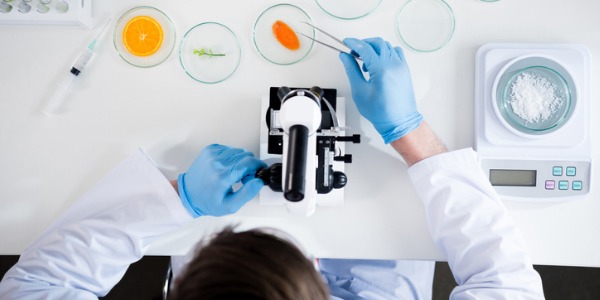What is a Food Innovation Technologist?
A food innovation technologist combines expertise in food science, technology, and culinary arts to drive advancements in the food industry. These individuals develop new and innovative food products, processes, and technologies that meet consumer demands, address health considerations, and enhance overall food quality.
Food innovation technologists typically work in research and development departments of food companies, where they collaborate with multidisciplinary teams to create novel and marketable food solutions. Their responsibilities may include experimenting with ingredients, improving production methods, and staying abreast of emerging trends in food technology to ensure that products remain competitive in the ever-evolving market.
What does a Food Innovation Technologist do?

Duties and Responsibilities
Food innovation technologists undertake a diverse range of duties and responsibilities to drive advancements in the food industry:
- Research and Development: Conduct in-depth research to identify new ingredients, technologies, and processes. Investigate the latest advancements in food science and technology.
- Conceptualization and Ideation: Generate creative ideas for new food products that align with market trends and consumer preferences. Collaborate with teams to brainstorm and conceptualize innovative concepts.
- Recipe Formulation: Develop and optimize recipes, considering taste, texture, nutritional content, and shelf life. Experiment with ingredient combinations to achieve desired product characteristics.
- Cross-Functional Collaboration: Collaborate with food scientists, chefs, marketing teams, and other stakeholders throughout the product development lifecycle. Integrate input from various departments to create well-rounded products.
- Quality Assurance: Implement rigorous quality control measures to ensure the safety and consistency of new food products. Conduct sensory evaluations and testing to meet quality standards.
- Process Improvement: Optimize production processes for efficiency, cost-effectiveness, and scalability. Identify areas for improvement in manufacturing and suggest solutions.
- Market Analysis: Analyze market trends, consumer behavior, and competitive products. Stay informed about regulatory requirements to ensure compliance.
- Documentation: Maintain detailed records of experiments, formulations, and testing procedures. Document research findings and share insights with the team.
- Communication and Presentation: Effectively communicate technical concepts to non-technical stakeholders. Present findings, progress, and recommendations to management and project teams.
Types of Food Innovation Technologists
Food innovation technologists encompass various specializations within the broader field, each focusing on specific aspects of food product development and improvement. Here are several types of food innovation technologists:
- Flavor Technologist: Specializes in creating and enhancing the taste profiles of food products. Works on developing unique and appealing flavor combinations.
- Texture Technologist: Focuses on optimizing the texture and mouthfeel of food items. Explores innovative methods to achieve desired textures in different food categories.
- Nutrition Technologist: Specializes in enhancing the nutritional content of food products. Works on fortifying foods with essential vitamins, minerals, and other nutrients.
- Ingredient Technologist: Explores and evaluates new ingredients for their impact on taste, texture, and nutritional value. Collaborates with suppliers to source high-quality and innovative ingredients.
- Food Process Technologist: Optimizes and innovates production processes to improve efficiency and product quality. Focuses on scaling up production while maintaining consistency.
- Food Packaging Technologist: Specializes in developing innovative packaging solutions for food products. Considers sustainability, freshness, and convenience in packaging design.
- Sensory Technologist: Conducts sensory evaluations to understand consumer preferences and perceptions. Utilizes sensory data to fine-tune product attributes.
- Food Compliance Specialist: Ensures that food products comply with regulatory standards and labeling requirements. Stays updated on changes in food safety and compliance regulations.
- Culinary Technologist: Combines culinary expertise with food science to create restaurant-quality or gourmet food products. Collaborates with chefs to translate culinary concepts into scalable products.
- Research and Development Food Technologist: Engages in overall research and development activities for new food products. Works on integrating scientific principles with culinary creativity.
What is the workplace of a Food Innovation Technologist like?
The workplace of a food innovation technologist is dynamic and often characterized by a blend of laboratory settings, collaborative offices, and production facilities. These professionals commonly find themselves working in the research and development departments of food companies, where they have access to well-equipped laboratories for conducting experiments, analyzing ingredients, and fine-tuning formulations. In these laboratory settings, food innovation technologists utilize cutting-edge technologies and scientific instruments to explore novel approaches to enhance the taste, texture, and nutritional profiles of food products.
Collaboration is a key aspect of the food innovation technologist's workplace. They work closely with cross-functional teams comprising food scientists, chefs, marketing experts, and quality control specialists. This collaborative environment fosters the exchange of ideas, expertise, and feedback throughout the product development lifecycle. Meetings and brainstorming sessions are common, allowing team members to collectively contribute to the ideation, development, and optimization of innovative food solutions.
In addition to laboratory and office spaces, food innovation technologists often engage with production facilities. These facilities provide a hands-on experience, allowing them to oversee the scaling up of production processes and ensuring that innovations are feasible on a larger scale. This aspect of their workplace involves close interaction with production teams, quality assurance personnel, and sometimes, suppliers to implement the developed solutions seamlessly into the manufacturing process.
Furthermore, the workplace of a food innovation technologist may extend to external environments, such as visits to ingredient suppliers, participation in industry conferences, and collaboration with external research institutions. Staying connected with the broader food industry is essential for keeping abreast of emerging trends, technologies, and market demands.
Food Innovation Technologists are also known as:
Food Product Design Specialist
Food Product Development Technician